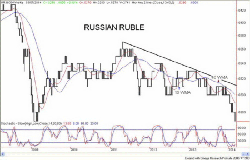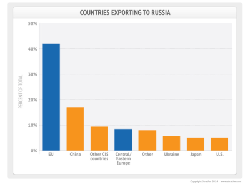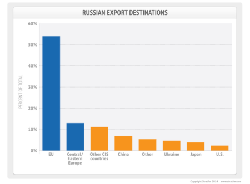|
|||
That Sinking Feeling….David Chapman (Click on images to enlarge) Charts created using Omega TradeStation 2000i. Chart data supplied by Dial Data One cannot help getting the feeling that no matter where this goes the crisis in the Ukraine that has morphed into the Russian move into the Crimea cannot come to any good end. Frankly, I hope I am wrong but history has often shown that once events of this nature get under way finding a solution often proves elusive. There has to be give and take and ultimately there are winners and losers. So far, it has been mostly take with little give and the biggest loser is often the one holding the weakest hand. In this case, that is the Ukraine. The Ukraine is essentially an economic basket case. The Ukraine has an estimated $137 billion of external debt (2013). Of that, some $15 billion (some reports suggest upwards of $30 billion) is estimated to be owed to Russian banks and much of the rest is held by European banks. The Ukraine is estimated to need some $25 billion in 2014 just to finance its current account deficit and pay back foreign creditors. They need at least $15 billion immediately and that amount was on offer from Russia but it has been withdrawn. The US has offered $1 billion but that is insufficient. The EU is working on a possible $15 billion package but with the Euro zone also having economic problems it just puts more pressure on them. An IMF bailout would come with stringent conditions that many say would be unacceptable to the new Ukrainian government. Its currency, the Hryvnia, which was fixed 8:1 to the US$ has fallen to 10:1 the US$. In order to stay alive they have been issuing short-term debt at rates as high as 15%. The Ukraine’s bonds have fallen largely to junk status. In order to defend its currency they have drained their foreign reserves from roughly $40 billion in 2011 to $12 billion today. Roughly half of its public debt is in a foreign currency so as their currency loses value their ability to pay it back actually weakens. Some 60% of the Ukraine’s exports go to Russia and other post-Soviet states such as Belarus and Kazakhstan. Much of the rest goes to the EU and some to China. Its main import is natural gas (NG) that comes from Russia. NG has been subsidized in the Ukraine and it would cause considerable hardship if it were to revert to full market price. Given the dispute between Russia and the Ukraine, supplies may not be guaranteed. The Ukraine is also a conduit for NG going to the EU. The US (and Canada) and the EU are considering trade sanctions against Russia. However, if the Ukraine is an economic mouse Russia is closer to an elephant. That suggests that it is quite limited as to what kind of sanctions might be imposed on Russia. The most drastic step would be banning firms from working with Russia. And if the US/EU go the “hilt” as suggested by US Secretary of State John Kerry, Russia can hit back as hard and could in a worst case scenario cause a financial panic in the west. The Russian Ruble has already been hit hard and has fallen to its lowest level since the financial crisis of 2008. The chart above of the Russian Ruble is not pretty and it could fall further. On the other hand, it is quite oversold and might find a double bottom. More likely, however, is that it falls further to new lows but possibly not that much further. The Russian Ruble is not a reserve currency. Central banks cannot just dump Rubles. Sanctions are a two way street with Russia. Possible measures are sanctions on trade, banning visas for politicians, freezing assets in the US or EU, suspending membership in the G8 and isolating Russian trade. Suspending G8 membership would just be symbolic and have little meaning. The G20 is more important today. Trade between the US and Russia is not that large. Russia could most likely replace whatever they import from the US elsewhere. On the other hand, Russian trade with the EU is significant as the charts below show. Russian Imports Source: www.stratfor.com Russian Exports Source: www.stratfor.com Russia exports a significant amount of NG. Most goes to the EU. While there are those who suggest that the EU should boycott Russian NG the EU would still have to replace it somewhere. Cutting off NG would hurt Russia as well as they are dependent on their exports for earnings. On the other hand, if Russia is not concerned about the revenues they could cut off the EU although that is not likely. The chart below shows where Russia’s gas goes. Germany and the Ukraine are the largest recipients. The EU also receives roughly 25-30% of its oil from Russia. Source: www.agorafinancial.com The biggest danger is that the US (and Canada) banned US firms from dealing with Russia. That would have a significant impact and may anger the firms more than it hurts Russia. Energy firms such as Exxon Mobil, Britain’s BP and France’s Total have significant investments in Russia. It may hurt Russia but it might hurt the US and EU corporations even more. Seizing assets in the US or the EU could bring an equal response from Russia. The Russian Duma is already drafting a law to confiscate property, assets and accounts of European or US (and presumably Canada as well) if sanctions were imposed. Kinross Mining is one of the largest Canadian companies in Russia. Russia is a significant participant in the London financial market. Sanctions against Russia could have a negative impact on the London market. While Russia has its own stock market, there are a number of Russian companies listed in London. Russia does not list in New York. European, UK and US banks have significant exposure to Russian debt. Bank loans are estimated to be upwards of $400 billion. In Europe, loan exposure is led by French, Italian and German banks. US banks could have upwards of $125 billion exposure to Russia. As well, Russia is holding roughly $138 billion of US Treasuries (2013). That is down sharply from $161 billion in 2012. In a worst-case scenario, Russia could default on its debt and dump its US Treasuries. Russia could also stop using the US$ as a reserve currency potentially causing a collapse of the US$. China has been the leader in calling for the end of the US$ as the world’s reserve currency and have been proposing to move away from the US$ to settle trade. Already Russia and China settle trade in Yuan and Rubles. All of this raises the spectre of the Russian default of 1998 that nearly brought down the global financial system. At the time, the US stock market only fell 22% but it could have been worse if the Fed had not stepped in to stem the drop through massive injections of liquidity into the market. As well, that period that saw the collapse of Long Term Capital Management (LTCM) that almost brought down the global financial system. Today the Federal Reserve’s capability to intervene in the market is considerably constrained given years of QE stemming from the 2008 financial collapse. A Russian default could quickly spread to other markets triggering a financial collapse that could be far worse than 2008. The EU, the UK and the US have passed legislation for bail-ins rather than bailouts in the event of a banking collapse. That would put depositors and bond holders at risk rather than the taxpayer in the event of a banking financial crisis. The economic collapse of the Ukraine is a problem. But even at its worst, it most likely is manageable although coming even as the EU and the US have not recovered from the financial collapse of 2008 it would still be a severe problem. On the other hand, sanctions against Russia that results in tit-for-tat retaliation could result in a financial crisis far worse than the financial crisis of 2008. Russia is not the Ukraine. It is the world’s 8th largest economy (Canada is 11th) and it is a significant player in the global market. Sanctions against Russia would be a dangerous game with potentially devastating effects. For that reason sanctions are not likely even though they are being threatened. While Russia would be a loser so would the west and a Russian default could result in global contagion and a global financial collapse. While sanctions do not make any sense one still cannot help having that possible sinking feeling as the great powers play out their game of chicken. ### Mar 6, 2014 David Chapman: Disclosure Copyright 2014 All rights reserved David Chapman |




